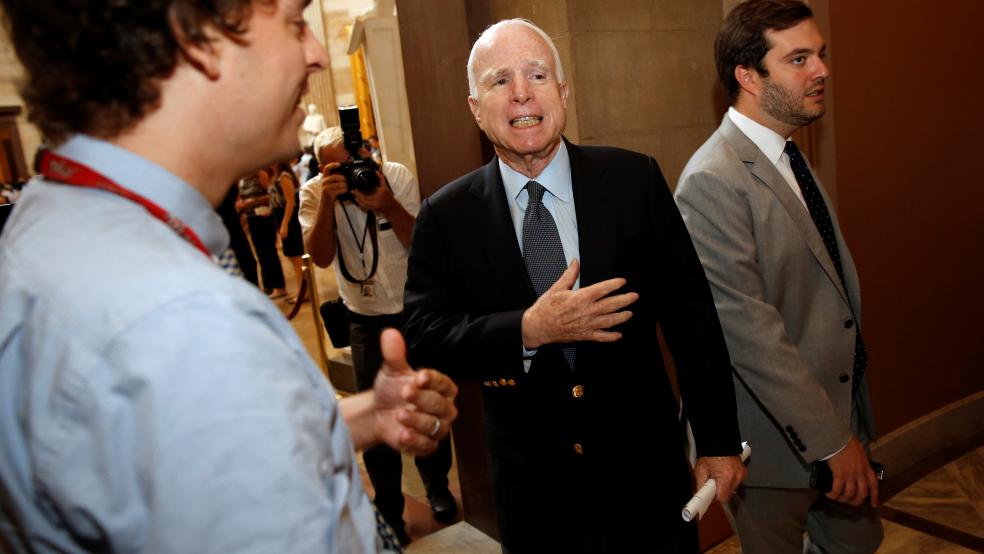There was an air of finality to things in the Senate early Friday morning when Arizona Sen. John McCain crossed party lines to join Maine’s Susan Collins and Alaska’s Lisa Murkowski in killing a last-ditch attempt by Republican leadership to pass and Affordable Care Act repeal bill.
The headline above New York Times columnist David Leonhardt’s byline Friday morning was, “Phew: The Health Bill Fails.” But as a sleep-deprived Washington crawled out of bed several hours later, reality began to creep back into the picture. The fight over the ACA isn’t over; the battlefield has just changed.
Related: Can Trump Get Anything Done? Conservatives Push 3 Simple Tax Cuts for 2017
The vote in the early hours of the morning had been on a measure that Republican leadership only made public a couple of hours before they expected to call the roll. Dubbed a “skinny repeal,” it was a mishmash of policies that even some senators who voted for it viewed with disgust. On Thursday afternoon, for example, South Carolina’s Lindsey Graham derided the bill as “horrible policy” and “a fraud.”
The bill would have repealed the individual insurance mandate imposed by the ACA, and in a nod to the arcane rules of the process Republicans were using to try to ram it past Democratic objections, it also repealed the employer mandate, but only for eight years. It contained other sops to elements of the GOP base, like a one-year ban on payments to Planned Parenthood from Medicaid, and the delayed implementation (for only three years?!) of a tax on medical devices.
A Congressional Budget Office score had promised that if the bill became law, millions of Americans would lose health insurance and those who were still able to buy it through the individual market would pay much higher premiums. For a considerable number of Republicans who voted for it, the hope was that the bill would never become law, but would force the House of Representatives to sit down in a conference committee and begin crafting a replacement.
Related: New Republican Plan to Repeal Obamacare Gets an Ugly Score From CBO
For some senators, hope wasn’t enough. Graham, McCain, Wisconsin’s Ron Johnson and Louisiana’s Bill Cassidy, in a press conference Thursday afternoon, said they couldn’t vote for it without express assurances from the House that it wouldn’t simply accept the Senate measure as written and vote to send it to the president.
A vague statement from Ryan released after their remarks was enough for the others, but not for McCain, who scuttled the bill with his “no” vote and a dramatic thumbs-down in the wee hours of Friday morning.
Senate Majority Leader Mitch McConnell was visibly frustrated with the conclusion of his months-long effort to find a repeal bill that could gather 50 votes in his conference. In remarks afterward, he expressed “regret” that the Senate had failed to achieve its goal, before adjourning until Monday, when he said lawmakers would take up some of the president’s judicial appointments.
But it wasn’t long before a tweet from President Trump reminded everyone that last night’s vote was nothing like the final curtain in the ACA drama.
Related: ‘Skinny Repeal’ Takes Center Stage, but May Find Little Love in Senate
3 Republicans and 48 Democrats let the American people down. As I said from the beginning, let ObamaCare implode, then deal. Watch!
— Donald J. Trump (@realDonaldTrump) July 28, 2017
Trump has long been promising to “let Obamacare implode,” arguing that doing so would strengthen his negotiating position even as it harmed the American people. And the drawn-out struggle over the GOP’s attempt to craft a legislative replacement for the law, or even to just repeal it with a promise to come back and replace it later, has often obscured the fact that he is well-positioned to just that if he chooses to.
The ACA’s original structure has already been partially dismantled, with payments to insurers that were part of the original bill suspended and insurance companies responding with higher premiums and lower deductibles. Other parts of it were never implemented it at all. Some large states, like Texas and Virginia, have refused to take part in the law’s Medicaid expansion, which would have provided millions of Americans with health care that they cannot currently afford.
Given that wobbly foundation, it wouldn’t take much prodding to tip the whole system over, and the president has all the tools he needs to do that.
Trump has already shown an interest in two of them.
Related: What a Waste—Senate Health Care Debate Squanders Time and Millions for Nothing
First, he could publicly and explicitly direct the Internal Revenue Service to redirect enforcement efforts away from the individual mandate that is a core part of the ACA. By requiring people to carry an insurance policy or face a financial penalty, the mandate helps balance the pool of people insured in the individual market by including both healthy individuals who might only need expensive health care in an emergency, and unhealthy people in need of expensive chronic care.
In a system where insurers are required to issue policies to all applicants, that mix is essential to avoid a “death spiral” of ever-sicker risk pools forcing insurers to charge ever-higher premiums until the market collapses.
Second, Trump could order his administration to cease making Cost Sharing Reduction payments to insurers. The payments are meant to compensate insurance companies for the cost of providing policies to lower-income Americans, but they have been challenged as unconstitutional by the Republican House of Representatives.
The administration has already put the insurance industry on edge by making the payment of the CSRs almost a month-to-month decision. Eliminating them entirely would drive many insurers out of the marketplace and would cause others to raise premiums to unsustainable levels.
In other words, those who think the battles over the ACA are finished are deluding themselves.





